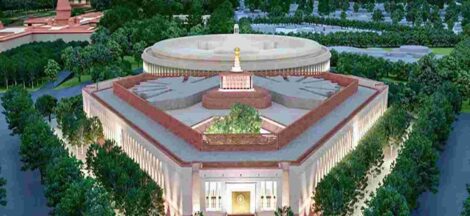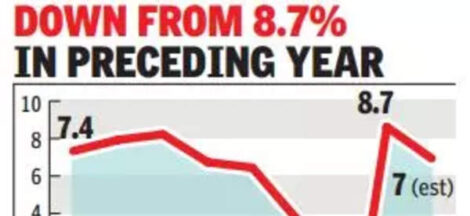By Nantoo Bnerjee
NITI Aayog’s warning that India should rethink about joining the Regional Comprehensive Economic Partnership (RCEP) forum could not have come at a more appropriate time. The government’s key think-tank had reportedly argued, in a note on free trade agreements (FTAs) and their costs to highly import-dependent India, that such a partnership could be disastrous to the country. India is one of the world’s biggest import-driven, deficient-balance-of-trade economies. Significantly, India’s joining RCEP would mean a huge market access to China — the key player in the grouping. And, that threatens to unsettle India’s economy and its domestic manufacturing programmes.
China is already India’s second biggest trade partner, after the United States, with a difference. With the US, India runs its only double-digit trade surplus. On the contrary, India runs the biggest trade deficit with China — over $52 billion out of the two-way trade of $84.44 billion in 2017. The Indo-China bilateral trade in 2017 rose by 18.63 per cent, year-on-year. The trade stagnated at around $70 billion for several years.
The trade with China touched and surpassed, for the first time, the $80-billion mark, last year. Notably, India’s trade, last year, touched historic high with China despite bilateral tensions over a number of issues including the China-Pakistan Economic Corridor, China blocking India’s efforts to bring about a UN ban on Jaish-e-Mohammad leader Masood Azhar, Beijing blocking India’s entry into the Nuclear Suppliers Group (NSG) as well as the military standoff at Doklam lasting 73 days. India has been pressing China for years to open its IT and pharmaceutical sectors for Indian firms to reduce the massive trade deficit without much success.
The RCEP is a trade pact between 10 Asean countries and their six FTA partners, namely Australia, China, India, Japan, Korea and New Zealand. It accounts for 25 per cent of global GDP, 30 per cent of global trade, 26 per cent of foreign direct investment (FDI) flows and 45 per cent of the total world population. “Given India’s inability to negotiate a good services deal in the past, RCEP negotiations, especially with China, need a second thought. Indian industry will have more to lose than gain if it agrees to a liberal tariff elimination schedule specially with respect to China.
At a time of growing protectionism and the US’ stance towards China, opening our market to China can prove to be disastrous, given that proper standards and processes are not in place in India,” said a note authored by NITI Aayog member V.K. Saraswat, Aniruddha Ghosh, an associate, and Mumbai-based economist Prachi Priya. The NITI Aayog note reportedly said while trade agreements are a means to promote bilateral trade, with both parties benefiting as a result of trade complementarities, with China, India’s trade seems to be skewed and China’s capacity overhang in most sectors may lead to a surge of imports into India with very limited access for Indian exports to the Chinese market.
Incidentally, it is not the first time that a top government agency and officials have opposed India joining the 16-member RCEP grouping. Earlier, Chief Economic Adviser Arvind Subramanian, attached with the union finance ministry, too had said that India needs to be extra cautious and take into account geo-strategic issues while moving ahead with the RCEP deal as it will also mean opening up the market to its adversary China. Former foreign secretary S. Jaishankar too had called for “observance of due restraint” and warned against concluding trade arrangements that are not in India’s medium-term interest. India’s trade deficit with RCEP countries has risen from $9 billion in 2004-05 to $83 billion in 2016-17, of which China alone accounts for over 60 per cent of the deficit.
India already has bilateral FTAs with Asean, Korea and Japan and negotiations are underway with Australia and New Zealand. At a time when India is aspiring to be a world leader in industry to protect its economy and generate large employment in its organised sector, such hugely growing trade deficits portend evil for the economy and its future growth.
There are a very few countries with which India posted trade surpluses in 2017. The top five among them were United States, earning India a trade surplus of US$22 billion; United Arab Emirates ($6.9 billion); Bangladesh ($6.6 billion); Nepal ($5.1 billion) and United Kingdom ($4.6 billion). Other countries with which India had trade surpluses of $4 billion and above were Singapore ($4.4 billion); Hong Kong ($4 billion) and Vietnam ($4 billion). Honestly, for the present, India does not have too many manufactured and high or medium technology products for export. Yet, it is good to note that trade between India and the US jumped substantially from $118 billion in 2016 to $140 billion in 2017. In 2016, India was the ninth largest trading partner of the US. India’s trade surplus with the US is noteworthy despite that fact that America has been a dependable supplier of high-cost defence and hi-tech manufactured products.
As of now, India has roughly one thousand aircraft orders pending for delivery with US companies, in stages. The import will further reduce India’s trade surplus with the US. Last year, India bought $2 billion worth of energy from the US. At this rate, India may have little trade surplus with the US in the next five years or so. Unfortunately, there is little to suggest that China will step up imports from India to bring about some kind of parity in the trade balance between the two countries. It would be suicidal for India to be a party of such trade pacts, including RCEP, that would substantially gag India’s economic and industrial growth to reach its full potential, at least in the next 10 years. (IPA Service)
The post Free Trade Pacts May Put Import-Led India Into Deep Trouble appeared first on Newspack by India Press Agency.


